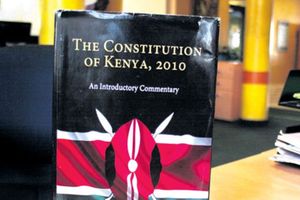
Revelers during the Shujaaz Memorial concert held on July 7, 2024 at Uhuru Park in Nairobi.
A few days ago I got an email from journalist Christine Mungai, who is curator of the media innovation hub Baraza Lab. It said, among other things, “You need to make time and read this incredible report. It will blow your socks off...” I did, and it blew not just my socks off, but the few remaining strands of hair on the head too.
The report is titled “Young & Kenyan: 7 Years, 13,000 Interviews With Kenya’s Most Important Generation. An Essential Guide To The Trends That Will Shape Their Future”. It is done by Shuuja Inc., which many might know better as the folks behind the very successful Shujaaz Comics.
One of Ms Mungai’s arguments was that based on the report, the recent Gen Z protests were entirely foreseeable. It was hard to get over the fact that the report was released in early 2023 and that it didn’t make the mother of all splashes.
Because young people are quite steamed about older folks stealing their voices, it is best to shut up and present a summary of the report (which quotes many data sources) without patronising elaboration or comment (and will not touch on the bits about mental health, sex and relationships).
11 million+ people
Today, one in five Kenyans are 15-24 years old. These 11 million+ people are now the biggest youth population the country has ever seen. This generation represents the beginning of a demographic shift that global economists have been waiting for. The “demographic dividend” is a change in demographic structure that has enabled countries across East Asia to rapidly accelerate their productivity, economic growth and prosperity. So far, it’s never happened in Africa. But experts say Kenya has a 15-year window of opportunity to realise its “demographic dividend” by investing in this pivotal young generation.
If Kenya seizes this opportunity, experts predict its per capita income could grow 12 times by 2050.
It’s a huge project—one that will only be successful if young people’s voices, experiences and ideas are heard. But here’s the problem: this generation doesn’t feel heard. In fact, in the midst of the pandemic, 81 per cent of them said their voices, ideas and experiences were ignored.
Kenya’s households were being pushed into poverty long before the pandemic. Our research shows that young people began to report a fall in average earnings, and a rise in the cost of key essentials, back in 2019. In fact, a further 1.2 million Kenyans fell below the poverty line between 2015 and 2021.
Financial insecurity
Facing increasing financial insecurity, this generation has had to step up to help their families and households stay afloat. Today, 100 per cent of 15-24-year-olds in Kenya report that they’re having to earn some money to help cover or supplement their costs, up from just 47 per cent in 2016.
At the end of 2021, over eight million 18-24-year-olds in Kenya were eligible to vote in the 2022 General Election. That’s the largest youth electorate in Kenyan history, representing around 28 per cent of the total electorate. But, as polls closed, available data suggests that young people are likely to have represented less than 10 per cent of votes.
Why didn’t young Kenyans register to vote? In a dipstick SMS poll conducted before the election, four of the top five reasons given for not registering to vote —and half of all responses—were linked to a loss of trust in the ability of the leaders on the ballot to change their lives for the better.
Ignored by decision-makers
Covid-19 is likely to have had a significant impact: In August 2020, 84 per cent of young people said they felt ignored by decision-makers in the pandemic response.
But peaceful 2022 elections are helping to restore trust: 56 per cent of young Kenyans said in a dipstick poll that the elections have changed their level of trust in the electoral process.
The 2022 elections left young people feeling hopeful. In a dipstick poll, 69 per cent used positive adjectives to describe the election, with the largest group (40 per cent of all respondents) saying they felt “hopeful”.
A far cry from the “apathetic youth” stereotype, our research shows that young Kenyans care deeply about democracy—seven in ten of them. They believe they have something to contribute to their communities, but only 46 per cent reported that they’re currently able to make a big impact in their community.
We asked young people: “What will you do first when you achieve success?” More than 50 per cent said: “Give back to my community, to other youth or to my family.”
It’s unsurprising that 85 per cent of young Kenyans believe the climate is changing. This generation is increasingly aware that the changing climate will affect every aspect of their futures. However, many young Kenyans recognise that they will power Kenya’s response to the crisis—and they’re asking for the support to thrive, not just survive.
The author is a journalist, writer and curator of the ‘Wall of Great Africans’. @cobbo3













